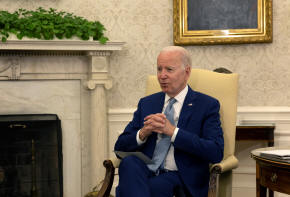Biden's June agenda: convince Americans the economy is healthy
 Send a link to a friend
Send a link to a friend
 [June 01, 2022] By
Trevor Hunnicutt and Howard Schneider [June 01, 2022] By
Trevor Hunnicutt and Howard Schneider
WASHINGTON (Reuters) - President Joe Biden
is planning a media blitz to lift his sagging opinion poll numbers
before November's congressional election, promoting his management of
America's recovery from the coronavirus pandemic and efforts to cool
spiraling inflation.
Biden's meeting with Federal Reserve chair Jerome Powell to discuss
inflation on Tuesday was the first event in a multi-week agenda, a White
House official said.
Through June, the official said, the White House plans to emphasize the
historic levels of job creation and low unemployment rate seen through
Bidenís first 17 months in office, his pledge to respect the Fedís
independence and coming efforts to ďput more money in the pockets of
working families."
Biden will speak on the jobs numbers on Friday, and Cabinet members
including Treasury Secretary Janet Yellen, Commerce Secretary Gina
Raimondo and economic advisers Jared Bernstein and Heather Boushey plan
dozens of television spots and other in-person events.

The prospects for Bidenís Democratic Party to maintain control of
Congress in the Nov. 8 election may hinge on how successfully he can
craft a positive economic narrative around what has become an
increasingly sour mood.
On the surface, working families have been doing well.
Unemployment is at levels more akin to the boom years of the 1950s and
1960s, wages for many lower-skilled occupations are rising, and bank
accounts, on average, are still flush with cash from coronavirus support
programs. Recent Fed reports and surveys reported households on average
in a strong financial position.
But confidence has waned, and in a recent Reuters/Ipsos poll the economy
topped respondents' list of concerns. Biden's approval rating has fallen
to 36%, the lowest of his presidency.
Inflation has hit a 40-year high, persisted longer than policymakers
expected when it first rose last year, and in recent months has prompted
the Fed to unleash what may prove one of its fastest ever efforts to
tighten monetary policy.
The opposition Republican Party, enmeshed in a civil war over former
President Donald Trump's 2020 election falsehoods, has united around
hammering Biden on inflation.
[to top of second column] |

U.S. President Joe Biden meets with New Zealand Prime Minister
Jacinda Ardern in the Oval Office at the White House in Washington,
U.S., May 31, 2022. REUTERS/Leah Millis

"What the Democrats have to do is resist the urge to explain how
inflation got caused and just go completely into like, here's what we're
gonna do about this," said Rodd McLeod, a Democratic political
consultant in Arizona, a state that can swing toward either major party.
Responses to a commentary that Biden wrote about his inflation-fighting
plans in the Wall Street Journal Tuesday underscored the size of the
challenge he faces.
By mid-day, the vast majority of more than 1,000 comments in one of the
country's few national newspapers dismissed the prescription drug
pricing and clean tax credit plans Biden laid out, while advocating
instead for lower taxes and more oil drilling and dismissing Biden's
ideas as fiction.
Taming inflation will require not only adept central bank
decision-making, but no small degree of luck. Global prices are buffeted
by such events as the Ukraine war and the coronavirus pandemic, and
whether another surge could tamp down China manufacturing again.
The best case for Biden at home is that tighter Fed monetary policy
slows the economy just enough that spending cools, and companies cut
back on job openings without actually cutting into jobs.
The alternative, should the Fed find inflation more persistent, is for
the central bank to move interest rates so high the economy tips into
recession with a significant rise in unemployment. September is expected
to be a pivotal month, with the Fed expected to take stock and decide
whether to become even more aggressive.
(Reporting by Trevor Hunnicutt; Writing by Howard Schneider; Editing by
Heather Timmons and Howard Goller)
[© 2022 Thomson Reuters. All rights
reserved.]This material may not be published,
broadcast, rewritten or redistributed.
Thompson Reuters is solely responsible for this content.
 |